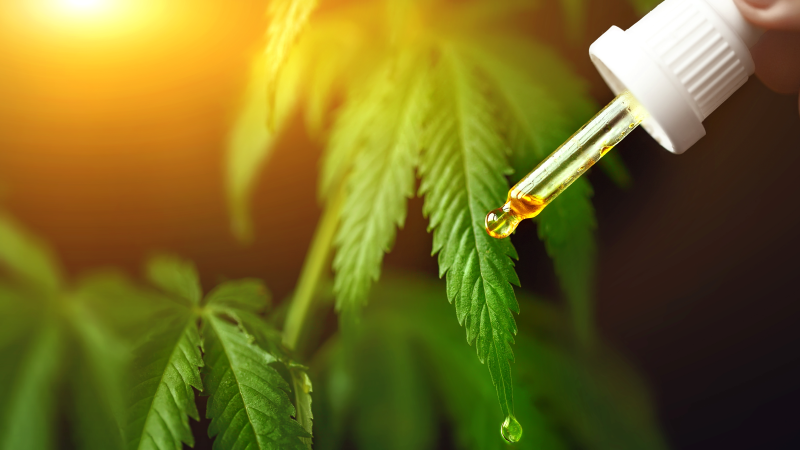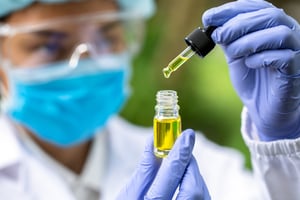Since the use of CBD officially became legal in the UK in 2017, followed by medicinal cannabis in 2018, demand has risen considerably. In the year up until August 2023, over 6 million people in the...
Is CBD Psychoactive?
Cannabinoids

Aug 8, 2023 | Published by Alberto Sainz
Cannabinoids
To celebrate National CBD Day in the U.S. on August 8th, Alberto Sainz, Principle Scientist – Human Studies, has taken a look at how additional research into CBD may improve patient acceptance of THC-based medicines.
What do CBD, THC, and paracetamol have in common?
Do you feel any effect from paracetamol if you take it without feeling ill or having a headache or fever? Probably not. However, when you feel ill or have a headache or fever, paracetamol is quite efficient at reducing these symptoms. Cannabidiol, also known as CBD, behaves in a similar way to paracetamol. You probably won’t feel its effects unless you are taking it to reduce or avoid specific symptomatology. The opposite would happen if you were to take tetrahydrocannabinol, also known as THC. Then you would certainly feel the effect of being ‘high’ even if you don’t take it to try to reduce any specific medical symptoms.
We know that these three drugs - paracetamol, CBD, and THC - have the ability to pass the blood-brain barrier and reach the brain. And once there, they are all psychoactive. While the term psychoactive is often used to refer only to the acute effects that we can consciously measure (e.g., feeling drunk after a few glasses of wine, the high associated with THC use, or feeling drowsy after taking sleeping pills), the term psychoactive actually refers to drugs that are able to modulate mental processes, even when we are not conscious about it.
In the case of THC, the feeling of being high is quite evident for anyone who uses it. In the case of CBD, the most apparent evidence of impact would be to measure its anxiolytic effects to prove its psychoactivity (Narayan et al., 2022). If anyone has doubts regarding considering the painkilling effect of paracetamol psychoactive, its effects on social cognition should be sufficient to convince even the skeptics (Mischkowski et al., 2016, 2019; Roberts et al., 2018).
An alternative term to represent those acute conscious effects of any drug is “intoxicating”, but I personally dislike this term. I disagree with the emphasis on ‘toxic’ when using such terminology. Psychotropic is another exotic alternative, but in the case of cannabis, I think psychotomimetic is the most appropriate term, as the high experience with THC shares some characteristics with psychotic traits and psychoticism (Ganesh et al., 2022).
So, does CBD cause psychotomimetic effects?
The answer is NO. Is it still psychoactive? YES. Do we feel these psychoactive effects if we take CBD? Maybe. As highlighted earlier in the blog, if someone takes CBD to reduce a physical or mental symptom where CBD shows effects, they will feel a reduction of that symptom. But if we do not have any symptoms, we probably won’t feel CBD’s psychoactive effects (Sainz-Cort et al., 2021).
So why is this so important? Knowing that CBD does not cause psychotomimetic effects, makes its medical use more acceptable and available for the entire population. Imagine that every time you took paracetamol, you got high. For some people, perhaps this would be fun. But for most others, it might be impairing or even repellent, and it would most certainly reduce the drug’s adaptability to any context.
In reality, this is precisely what can happen with the medical use of THC. While the dosing strategy is one of the best ways to reduce THC psychotomimetic effects, fear of getting high is still one of the main barriers to use for those patients that have never used cannabis before. THC has many medical properties, but many patients refuse to consider it due to its psychotomimetic effects. And one of the solutions to this, interestingly (for me at least!), is that CBD is not only able to reduce anxiety and other symptoms but can reduce THC psychotomimetic effects.
CBD psychoactive effects can counteract some of the psychotomimetic effects induced by THC (Ganesh et al., 2022; Sainz-Cort et al., 2021). Exactly – maybe read that again! This means that CBD, besides all its other medical properties, can help to reduce the psychotomimetic effects of THC medication, helping patients take advantage of the medicinal properties of THC without getting the high.
However, it must be acknowledged that the scientific community is not entirely convinced about these specific properties of CBD. This is because there have been a few studies that have failed to be able to replicate these results (Englund et al., 2023). Despite the inconclusive evidence provided by these studies, clinical experiences, patient reports, and even recreational users support the claim that CBD counteracts the effects of THC. How this happens, under what circumstances, and at which dosage levels are some of the challenges that scientists, doctors, and patients will have to discover in the future. But the prize for this future research will be to be able to access the practical medical effect of THC with minimum discomfort for individual patients.
In a future blog, I may take a closer look at the other CBD psychoactive properties, or maybe discover other links between CBD, THC…and paracetamol. So, stay tuned or link to me on LinkedIn.
Read more about how we can assist your company with cannabis application and testing needs here.
References
Englund, A., Oliver, D., Chesney, E., Chester, L., Wilson, J., Sovi, S., De Micheli, A., Hodsoll, J., Fusar-Poli, P., Strang, J., Murray, R. M., Freeman, T. P., & McGuire, P. (2023). Does cannabidiol make cannabis safer? A randomised, double-blind, cross-over trial of cannabis with four different CBD:THC ratios. Neuropsychopharmacology, 48(6), Article 6. https://doi.org/10.1038/s41386-022-01478-z
Ganesh, S., Cortes-Briones, J., Schnakenberg Martin, A. M., Skosnik, P. D., D’Souza, D. C., & Ranganathan, M. (2022). Delta-9-Tetrahydrocannabinol, Cannabidiol, and Acute Psychotomimetic States: A Balancing Act of the Principal Phyto-Cannabinoids on Human Brain and Behavior. Cannabis and Cannabinoid Research. https://doi.org/10.1089/can.2021.0166
Mischkowski, D., Crocker, J., & Way, B. M. (2016). From painkiller to empathy killer: Acetaminophen (paracetamol) reduces empathy for pain. Social Cognitive and Affective Neuroscience, 11(9), 1345–1353. https://doi.org/10.1093/scan/nsw057
Mischkowski, D., Crocker, J., & Way, B. M. (2019). A Social Analgesic? Acetaminophen (Paracetamol) Reduces Positive Empathy. Frontiers in Psychology, 10, 538. https://doi.org/10.3389/fpsyg.2019.00538
Narayan, A. J., Downey, L. A., Manning, B., & Hayley, A. C. (2022). Cannabinoid treatments for anxiety: A systematic review and consideration of the impact of sleep disturbance. Neuroscience and Biobehavioral Reviews, 143, 104941. https://doi.org/10.1016/j.neubiorev.2022.104941
Roberts, I. D., Krajbich, I., Cheavens, J. S., Campo, J. V., & Way, B. M. (2018). Acetaminophen Reduces Distrust in Individuals With Borderline Personality Disorder Features. Clinical Psychological Science, 6(1), 145–154. https://doi.org/10.1177/2167702617731374
Sainz-Cort, A., Jimenez-Garrido, D., Muñoz-Marron, E., Viejo-Sobera, R., Heeroma, J., & Bouso, J. C. (2021). Opposite Roles for Cannabidiol and δ-9-Tetrahydrocannabinol in Psychotomimetic Effects of Cannabis Extracts: A Naturalistic Controlled Study. Journal of Clinical Psychopharmacology, 41(5), 561–570. https://doi.org/10.1097/JCP.0000000000001457


